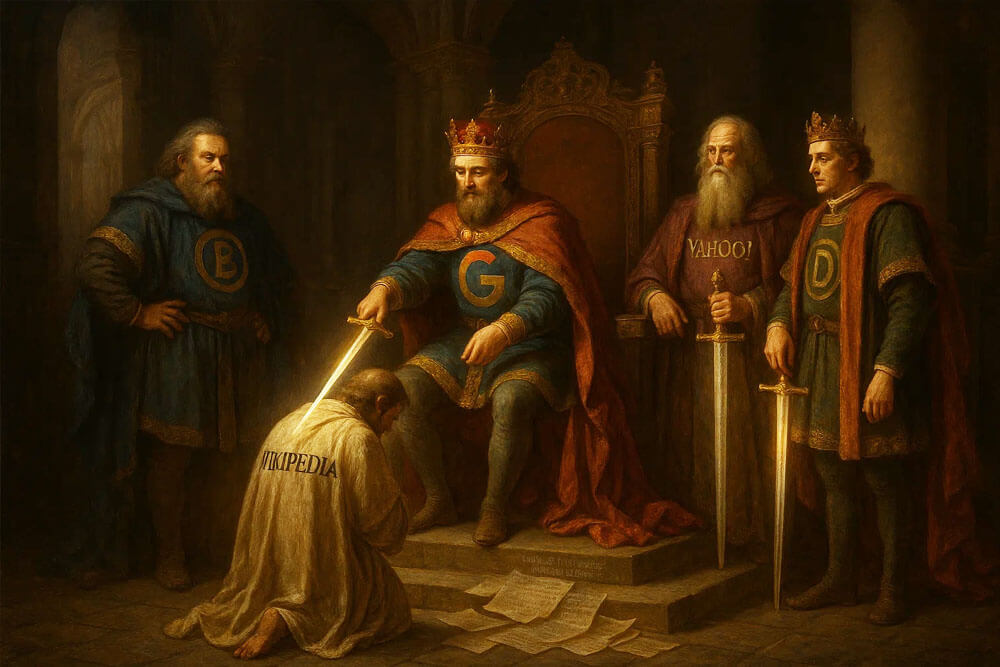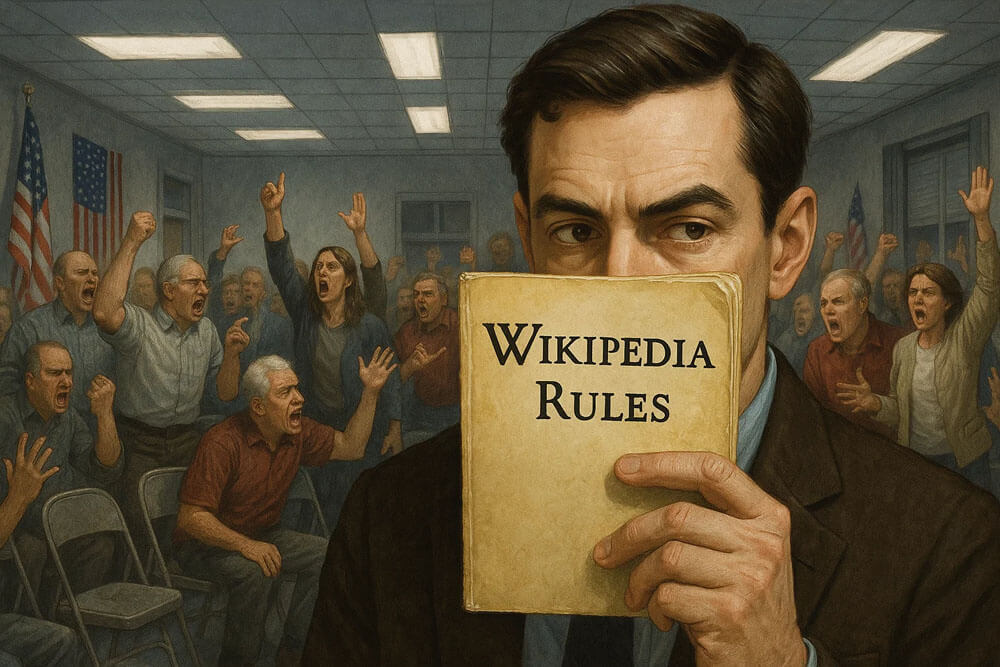For over 15 years, an invisible hand has shaped what the world thinks is true. Operating under the alias Grayfell, one anonymous Wikipedia editor has quietly rewritten public understanding of the most controversial figures, ideologies, and movements without ever revealing his name. With more than 87,000 edits since 2008, Grayfell has targeted politically charged topics like Jared Taylor, Carl Benjamin, Milo Yiannopoulos, Nick Fuentes, Gamergate, and the men’s rights movement.
By every metric, Grayfell is one of Wikipedia’s most powerful and protected ideological enforcers. Despite routinely editing articles about living persons and politically sensitive issues, he has never been sanctioned, warned, or blocked on any Wikimedia project.
This is not just rare. It is statistically extraordinary.
The Phantom Editor with Real Power
Grayfell doesn’t just edit. He moderates, corrects, and guards the ideological gates. Whether adding labels like “far-right,” “white supremacist,” or “conspiracy theorist,” or removing links to disfavored sources, Grayfell operates with an air of unchallengeable authority citing “reliable sources” that just so happen to align with progressive orthodoxy.

Some of his most controversial edits include:
- Arguing on the Carl Benjamin talk page that the subject should be labeled “far-right,” citing press sources while ignoring Benjamin’s denials.
- Participating in the Alt-right talk page to link the movement to Ayn Rand, Tea Party activists, and Birtherism.
- Rapidly removing links to the International Conference on Men’s Issues and A Voice for Men, labeling them hate groups without presenting a neutral perspective.
- Editing the Antifa (United States) article to soften references to political violence and downplay the group’s aggressive tactics.
These are not casual contributions. They are deliberate, persistent, and cloaked in the language of policy. In truth, Grayfell functions as a political filter ensuring that only one version of truth survives.
How Google Made Wikipedia God
So why does it matter?
Because between 2007 and 2009, search engines like Google, Bing, and Yahoo permanently privileged Wikipedia pages in their results. Wikipedia became the top-ranked source for nearly every public figure and hot-button issue. This algorithmic anointing transformed the site from an open-source encyclopedia into the world’s de facto Ministry of Truth.
Wikipedia didn’t just reflect reality. It began defining it.

Editors like Grayfell understood this. They saw that they weren’t contributing to a neutral project. They were shaping public consensus one footnote at a time. Their incentive became clear: control the edit history, and you control belief.
Grayfell’s Networked Power
Unlike most editors who focus on a few niche topics, Grayfell operates across multiple Wikimedia platforms. Through the CentralAuth system, he holds active accounts and editing privileges on:
- Wikipedia
- Wikimedia Commons
- Wikivoyage
- Wikidata
- Wiktionary
This networked access allows him to influence not only encyclopedic content but media uploads, category structures, and cross-platform linkage. His fingerprints are everywhere. No other known editor has touched so many controversial pages with so little internal pushback.
The Lie of Omission: Wikipedia’s Most Powerful Weapon
What makes Wikipedia so effective and so dangerous in the hands of biased editors is not just what it says, but what it refuses to say.
This is Grayfell’s specialty. His most powerful tool isn’t overt falsehood, but subtraction — a quiet erasure of dissent, context, or clarification that might disrupt the story being told. The result is a one-sided narrative dressed in the neutral robes of objectivity — propaganda disguised as consensus.
Take the American Renaissance Wikipedia page. The term “white supremacist” is used as a definitive descriptor of the publication and its founder, Jared Taylor. Nowhere is Taylor’s own position included his rejection of the label, his advocacy of peaceful race realism, or his belief in voluntary separation without hatred. No quotes from legal scholars or civil libertarians who dispute the SPLC’s framing. No counterpoints. No context.
They’re not hard to find. They’re just not allowed.
Grayfell doesn’t falsify. He subtracts. And what’s left is a narrative so clean it feels like truth.
This is more insidious than lying. It’s a deception cloaked in policy, wrapped in hyperlinks, and footnoted into perceived legitimacy. Most readers will never realize the truth was amputated before it could stand trial.
Wikipedia, in this model, becomes not a repository of knowledge, but a narrative engine. And editors like Grayfell are the machinists.
Grayfell and the Sanitization of ANTIFA: A Case Study
One of the clearest examples of Grayfell’s ideological bias appears in his handling of the Antifa (United States) article. The sanitization process is best understood through a direct comparison:
- Wikipedia’s Framing (Curated by Grayfell & Co.): “Activists who engage in protest tactics.”
- Documented Reality (Per Mainstream Sources): “Activists who have been documented assaulting journalists (e.g., Andy Ngo) and firebombing facilities (e.g., Tacoma ICE facility).”
- Wikipedia’s Framing: Events described as “clashes” or “confrontations.”
- Documented Reality: Events involving coordinated black bloc assaults, melee weapons, and projectiles.
Following the 2017 Charlottesville unrest, editors like Grayfell systematically removed references to Antifa’s violent tactics, even when backed by establishment sources. The justification was Wikipedia’s “undue weight” clause, deployed when inconvenient truths threaten the desired narrative.
Grayfell participated in talk page discussions opposing the inclusion of major incidents, arguing they were “routine” or “not notable” an astonishing claim given their national coverage. The end result is a Wikipedia article that bears little resemblance to the real-world organization, reading like a sterile grant proposal.
Clever, Covered, and Untouchable: The Protection Racket
Grayfell’s longevity is not an accident. It is a feature of the system. Wikipedia’s internal hierarchy—admins, “trusted” editors, and Arbitration Committee veterans—creates a self-reinforcing power structure. Loyalty to the ideological consensus, not adherence to neutrality, determines protection.

He has mastered the art of “lawful evil” operating just within the technical bounds of Wikipedia’s voluminous policy while completely violating its spirit of Neutral Point of View (NPOV). This makes him a valuable asset to the internal admin class. He does the tedious, necessary work of enforcing ideological conformity without creating the obvious scandals that would force the Arbitration Committee (ArbCom) to act.
He is a useful instrument, and useful instruments are protected.
The Labor Question: Hobbyist or Operative?
Eighty-seven thousand edits. This represents thousands of hours of cognitive labor not just the mechanical act of typing, but the ideological framing, meticulous source-hunting, and exhausting policy debates. This level of commitment is economically anomalous; it is the output of a full-time job.
Is Grayfell a paid operative? While no direct evidence exists linking Grayfell to a funded influence operation, his editing patterns and time investment are consistent with institutional support whether through NGOs, academic programs, or other aligned networks. The most likely vector is the NGO network organizations like the ADL and SPLC, which have a documented history of funding Wikipedia-adjacent initiatives. The Wiki Education Foundation, for instance, funnels ideologically vetted students into editing. Grayfell could be a product, a manager, or a beneficiary of this pipeline.
The strategic value of controlling Wikipedia’s narrative pipeline is undeniable. Grayfell’s sterile style and strategic focus are consistent with institutional, rather than personal, objectives. He may not be a spook, but he is an asset in a larger, softer form of information warfare.

The ghost is being named.
Conclusion: The Watcher Is Being Watched
For years, Grayfell operated in the shadows shielded by policy, empowered by Google, and protected by Wikipedia’s inner ring. But the mask is slipping.
His alias is now known. His edit history exposed. And his tactics once quietly effective are being scrutinized by the very public he hoped to mislead.
Grayfell and his cohort may still win battles. They may label dissidents as extremists and curate history one edit at a time. But their victories are hollow. Each strategic omission chips away at the last fragile illusion: that Wikipedia is neutral.
It’s not. And the world is starting to notice.
This exposure is the first step. The next is building alternatives. Support and contribute to parallel projects like Infogalactic that reject this corrupt model. Use tools like the Wayback Machine to archive his edits and create a permanent public dossier. We cannot reform a captured institution; we must build our own.
Wikipedia, your kingdom must come down.
—Wolfshead





What a tool of the Lord of Lies. A super skilled, privileged liar.
Exactly.